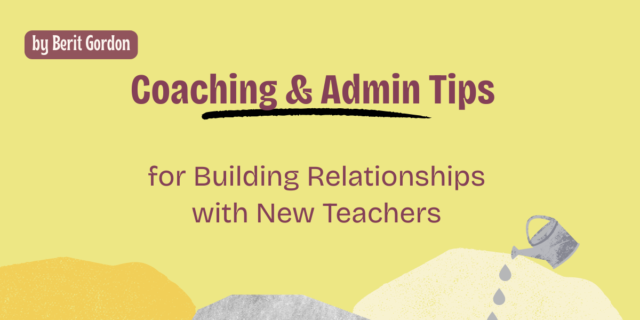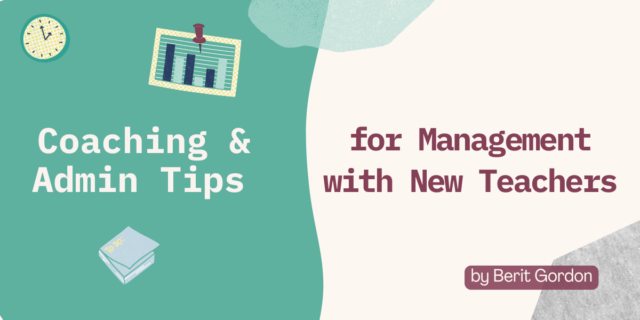
To kick off our month-long webinar series for the new school year, Heinemann is featuring a ”Classroom Essentials for Right Now” back to school blog series written by Heinemann author Christopher Lehman and his colleagues from The Educator Collaborative. Each blog offers practical, heartfelt advice on how to start the year off right. From being a thoughtful, reflective practitioner to creating a joyful community of learners, honoring student voice and choice. How do I choose the right books? How do I help my students become better writers? What do I do about grades? Join us starting this week as Chris and his colleagues share their “Classroom Essentials for Right Now.” In part two of Chris' series, he reminds us our children are still calling to us.
To kick off our month-long webinar series for the new school year, Heinemann is featuring a ”Classroom Essentials for Right Now” back to school blog series written by Heinemann author Christopher Lehman and his colleagues from The Educator Collaborative. Each blog offers practical, heartfelt advice on how to start the year off right. From being a thoughtful, reflective practitioner to creating a joyful community of learners, honoring student voice and choice. How do I choose the right books? How do I help my students become better writers? What do I do about grades? Join us starting this week as Chris and his colleagues share their “Classroom Essentials for Right Now.” In part two of Chris' series, he reminds us our children are still calling to us.
Educator Self-Reflection as a Political Act
Part Two: Challenging the World Outside
Written by Christopher Lehman
In Part One, we looked inward to reflect on our personal mission. In this post, we will look critically at our beliefs and actions.
What I most want to remind you today, here near the start of the school year, is that our children not only called you to this profession, they are still calling you. In fact, they are calling you, calling all of us, more loudly than ever.
When lightening strikes and thunder rumbles, children run to an adult’s bedside. They look to those who love them to help them weather the storm.
One of the first ways to begin is likely not deciding what our students can do, but first focus on what we should do. Starting with self-reflection may be the most important political act you take up, right now. It may be the most important action that can support our children through the downpour and help them build a brighter world for us all.
What to reflect on:
- You may reflect on who is represented in your classroom library and who is not. Scholars in Culturally Relevant Pedagogy as well as others, like the influential Dr. Rudine Sims Bishop, tell us that when children do not see themselves in books they can internalize the idea that the greater society does not value them. Equally important, children who do not see other’s experiences represented in books are robbed of this awareness and, as Dr. Bishop notes, are “ in danger of developing a false sense of their own importance in the world” as opposed to other people (This article from The Journal of Children’s Literature describes more).
- You may reflect on who your class connects with or does not. Technology helps us to make cool stuff, yes. If, however, your classroom devices are used mostly for searching and printing, but not sharing and connecting, then your students are missing the opportunity to develop global connections. Pernille Ripp, a friend and member of my organization, The Educator Collaborative, is a classroom teacher who several years ago hatched the simple idea of connecting classrooms with a good book. The Global Read Aloud now connects millions of children, every fall. What is so inspiring is not just the act of loving great stories, it is how children from all over the world get to connect online and see, firsthand, how they are just like me.
- You may reflect on your management. Who is disciplined by you or your school? Who is not? Research shows us that, overwhelmingly, though statistically the rates and types of misbehavior are equal, African American and Latino children, beginning as early as Kindergarten, are removed from instruction more than white children. Furthermore, the reasons for these removals overwhelmingly align to personal, ingrained, bias then they do to actual severity of behavior (This report and organization is an excellent source of research on this topic).
- You may reflect on the role of families in your classroom. Families get their children to school, support homework, complete field trip slips, but that cannot be all if we are building classrooms that engage and raise all children. Research shows that when families are woven into school life, are regularly present, invited, and involved, everyone benefits. Families become more comfortable with school, classrooms benefit from volunteers, and everyone learns when expertise is shared across generations (Here is one report to get you started).
In Part 3 of this series, I’ll share a new tool we have developed at The Educator Collaborative to help you quickly determine some areas, like these, to focus your reflection on.
♦ ♦ ♦ ♦
For more information, and to join Chris and his colleagues form The Educator Collaborative in a live online PD series this month, click here (and check back tomorrow for part three in Chris' blog series):
♦ ♦ ♦ ♦

Christopher Lehman is the Founding Director of The Educator Collaborative. He is the author of several popular Heinemann titles, including Falling in Love With Close Reading. He is an international speaker, consultant, and New York Times best-selling author. He holds degrees from UW-Madison, NYU and Teachers College, Columbia University. Chris has been a middle-school teacher; a high-school teacher; a literacy coach; and a Senior Staff Developer with the Teachers College Reading and Writing Project at Columbia University. Now with The Educator Collaborative, he is working to innovate the ways educators learn in-person and online, providing opportunities for teachers, coaches, and administrators to share their expertise so students can hold their brightest futures. Chris can be reached at TheEducatorCollaborative.com or on Twitter at @iChrisLehman.


